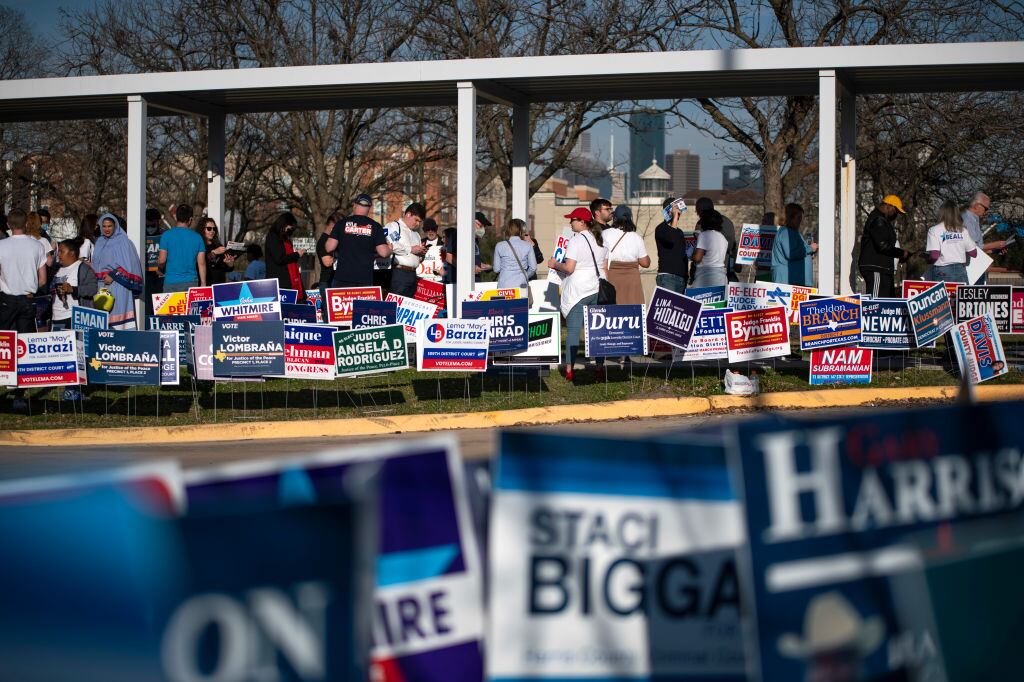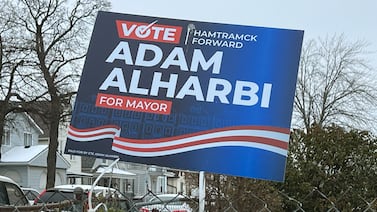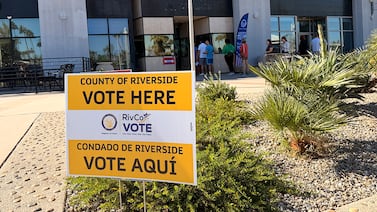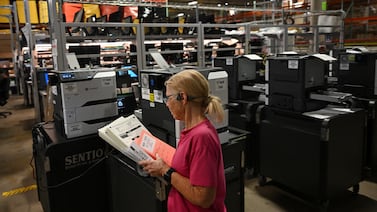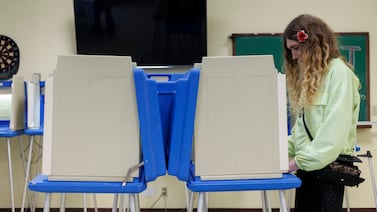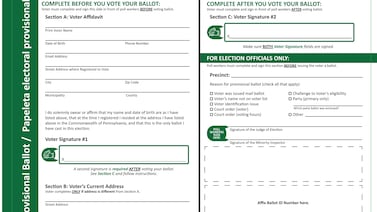Votebeat is a nonprofit news organization reporting on voting access and election administration across the U.S. A version of this post was originally distributed in Votebeat’s weekly newsletter.
Remember that time, more than a year ago, when Texas lawmakers passed a sweeping voting law that added changes to the process of voting by mail and scrutinized election workers?
That law was mostly driven by baseless claims of widespread voter fraud from the 2020 election. And with its Republican majorities in both chambers, Texas in recent years has moved a lot of bills that make changes to the state’s elections, to be greeted by a Republican governor who’s eager to sign them (unlike in, say, Pennsylvania, Arizona, or North Carolina).
Election fraud conspiracies still abound in the Texas Capitol and in other states. But this year in Texas, the election legislation most likely to get approved largely stems from continued Election Day stumbles in the state’s largest county — Harris County, home to Houston.
State Sen. Paul Bettencourt, a Republican, filed 12 separate election-related bills and “the genesis” of all of them, he said, was Harris County’s mismanagement of recent elections.
“This is about a catastrophic lack of performance in Harris County,” Bettencourt said last week during an hours-long Senate committee hearing to discuss the bills. The House of Representatives’ election committee also held hearings on some of the bills last week. “It’s too big to ignore. The state can’t afford this type of problem in Harris County and neither can the residents.”
During last November’s midterm election, hundreds of voters waited for hours across multiple polling locations due to delayed openings and malfunctioning voting machines. Other polling sites ran out of ballot paper. The county has yet to say whether the problems that day prevented anyone from voting. The county and the election administrator have been sued by the local Republican party and several candidates seeking a new election.
Legislation to give state officials more authority over local elections appears poised to win lawmakers’ support. Among the bills moving forward that would give the state more oversight over how counties conduct their elections:
- A bill that would give the secretary of state the authority to intervene and suspend and replace an election administrator.
- Another would also allow the office to step in to supervise and assist a county that fails to submit precinct vote totals at least 24 hours after the polls close.
- One bill would require local election officials to answer questions related to election irregularities and provide explanations when information is requested by election judges, local and state party chairs, or candidates. If the county fails to provide a “satisfactory” reason, the secretary of state’s office could step in, assess, and if necessary, audit the county.
As Votebeat has reported, bills such as these could have implications for the hiring and retention of election officials and could change the working dynamic between the counties and the secretary of state’s office. Some voting rights advocates say this type of legislation is also concerning because it “infringes on the rights of county governments” who are best positioned to address the needs of their voters.
“Elections policy in Texas is so difficult because trying to build something that’s going to work in Harris County it’s not going to work the same way in some small rural county,” said Daniel Griffith, senior director of policy at Secure Democracy USA. “So anytime we see a one-size-fits-all bill, that raises a certain amount of red flags.”
These are the other election administration and voting bills gaining momentum this session, which we’re watching closely:
- A bill that would allow the secretary of state to appoint election marshals to enforce the election code and address violations;
- A bill that would raise the penalty of illegal voting to a felony;
- A bill that would allow Texas to withdraw from the Electronic Registration Information Center if the state can find a replacement;
- And a bill that would penalize district attorneys who refuse to prosecute certain crimes, including election crimes.
All of these bills have already been discussed in Senate committees, with supporters and opponents offering testimony. Some have been voted out of committee and recommended for Senate approval, though they’d still need to get through the state House and be signed by the governor in order to become law. And all of that must happen quickly—- the legislative session will be over by Memorial Day.
Back Then
Last week, the Associated Press reminded us all of a favorite of voting history fiends: The alleged voter fraud that may or may not have allowed former President Lyndon B. Johnson to secure a seat in the U.S. Senate in 1948.
In 1977, Luis Salas, a former South Texas election judge, told an AP reporter that “Johnson did not win that election; It was stolen for him. And I know exactly how it was done.” The story sent shockwaves through the country, though of course nothing could be done.
So, why is this coming up now? The LBJ Library has released the tape of the AP reporter’s interview with Salas.
In Other Voting News
- Donald Trump last week became the first former president to face criminal charges after Manhattan District Attorney Alvin Bragg indicted him on 34 counts of fraud in a case related to hush payments paid to a porn star before the 2016 election that, prosecutors said, were intended to influence the election and deceive state tax authorities, the New York Times reported.
- Ohio voters will have to present a driver’s license, state identification, or passport when voting under a new law that took effect this month, and can no longer use a utility bill or official mail to verify their identity, WXVU reported.
- A federal judge is allowing a case accusing Galveston County officials of violating the Voting Rights Act by drawing skewed political maps that gerrymander along racial lines and dilute the votes of communities of color to move to trial, the Texas Tribune reported.
- A clerk for a Michigan township who has been stripped of her authority to administer elections amid an investigation into accusations that she stole election equipment in an attempt to prove fraud will face a recall election next month, Bridge Michigan reported.
- A liberal judge’s victory in a Wisconsin Supreme Court race last week will shift the balance of power on the court, and Wisconsin Democrats said their first priority would be to challenge the state’s redistricting maps, The New York Times reported.
- The Cook County jail is Chicago’s most active voting precinct since the jail added in-person voting in 2020, the Chicago Tribune reported. The vast majority of inmates have not yet faced trial and are registered voters, though same-day registration is available.
Natalia Contreras is a reporter for Votebeat in partnership with the Texas Tribune. Contact Natalia at ncontreras@votebeat.org.

